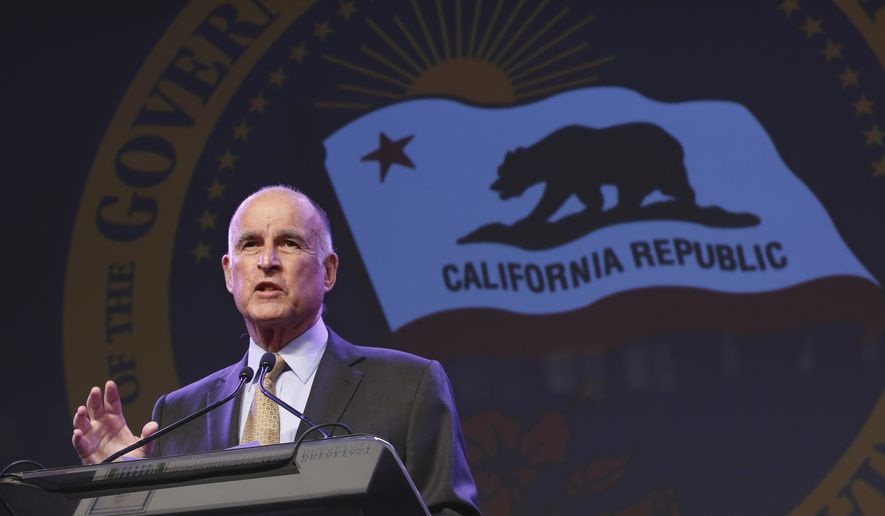Within hours of the Brexit vote, Texas independence activist Daniel Miller was flooded with messages from people in other states with one question: How can we do this?
The United Kingdom’s vote Thursday in favor of severing ties with the European Union has invigorated secession movements across the pond from California to New England by showing “there is a choice for people out there,” said Mr. Miller, who heads the Texas Nationalist Movement.
“Even since the Brexit vote, what we’ve seen is we’ve been contacted by people in other states that are looking to us for advice about how they can begin the process of asserting the independence of their states,” he said. “We’re looking across the Atlantic and witnessing what to many is this surprising Euroskeptic movement, although it’s not really surprising if you pay attention over there. What’s the most surprising is now the rearing of its head of the Ameroskeptic movement, or the federal skeptic movement.”
In the hours after the British election, social media exploded with Brexit-inspired hashtags such as #Texit, #Calexit and #NHexit. Although it’s safe to assume some of those posts were made in jest, the surge in interest garnered enough attention to make its way into the presidential campaign.
The issue came up at a press conference Saturday in Scotland, where presumptive Republican presidential nominee Donald Trump was asked what he thought about a Texas secession. He chalked up the effort to dissatisfaction with the federal government.
“Texas would never do that if I’m president,” said Mr. Trump, who visited Scotland as part of a tour of his golf courses.
SEE ALSO: After Brexit, support soars for Texas secession movement ‘Texit’
For pro-independence activists such as California’s Louis Marinelli, what makes the Brexit vote so important is that it shows secession isn’t just a relic of the 19th century.
“This is an example of an independence movement occurring in the Western world, a modern-day, 21st-century [case] of a political entity seceding from a political union,” said Mr. Marinelli, who heads the Yes California Independence Campaign.
“And so now Californians who hear the word ’secession,’ they don’t have to think of the Civil War anymore,” he said. “Now they have a modern day example of how it can happen peacefully and legally and constitutionally, and that’s the path and process we intend to mimic here in California.”
As with the Texas campaign, Yes California has seen an uptick of interest.
“We have a lot of people sending us messages and a lot of people want to find our online digital version of our independence referendum,” said Mr. Marinelli. “We have a lot of people who have joined our Facebook page, a lot of people who are talking about this issue on Twitter. The #Calexit hashtag, for example, has begun organically. There’s another one called #Caleavefornia.”
Yes California, which formed in August after the shuttering of Sovereign California, has been gathering support for an initiative aiming for the November 2020 ballot that would instruct the state Legislature to begin the process of severing California from the union.
SEE ALSO: Calexit or Caleavefornia? Brexit lifts California independence campaign
In Texas, Mr. Miller took advantage of the social media blitz to call for Gov. Greg Abbott, a Republican, to “support a similar vote for Texans.” An online sign-up sheet on the Texas Nationalist Movement website asking voters to pledge to support a state independence referendum has grown by about 3,000 signatures for a total of more than 264,000 since the Brexit election.
“The issue for us here in Texas is the right to govern ourselves, to make our own laws,” Mr. Miller said. “To raise money and spend money as a nation according to our priorities, to address our challenges without having an overriding veto from an over-bloated bureaucracy that doesn’t know us, doesn’t love us, doesn’t care for us and does not have our best interests at heart.”
The Texas Tribune took the issue seriously enough to respond with a Friday fact-check examining whether secession is possible under the Constitution.
“Bottom line: While Brexit may have stirred the secessionist pot, a similar Texit would not be legal. Texas has a unique right among states to split itself into five states but not to secede from the United States of America,” said The Tribune.
That applies only if a state opts to secede without federal permission. Under the 1869 Supreme Court case Texas v. White, states cannot leave the union unilaterally.
“The story out there is that states can’t secede, but they can. The problem is they can’t secede unilaterally,” said Mr. Marinelli. “You can’t just declare yourself independent. But if you get the consent of the other states, and there’s a way to do that through the amendment process, then you can do that legally and peacefully.”
Elsewhere in North America, the push for northern Mexico to secede is now #Mexit, while the Quebec independence movement has been dubbed #Quebexit.
California Gov. Jerry Brown, a Democrat, may have inadvertently inspired supporters of Calexit by joking in March that if Mr. Trump is elected as president, “we’d have to build a wall around California to defend ourselves from the rest of this country.”
“There’s always an element of truth when people make a joke. And there are certainly a lot of jokes coming from the governor’s office,” said Mr. Marinelli. “So maybe he partially supports this. Who knows? We’ll see what happens.”
Texas Supreme Court Justice Don Willett, known for his tongue-in-cheek posts on Twitter, said naysayers of the independence debate may be forgetting one key factor.
“One overlooked upside of #Texit: COWBOYS/TEXANS SUPER BOWL. Every year!” said the high court justice.
• Valerie Richardson can be reached at vrichardson@washingtontimes.com.




Please read our comment policy before commenting.